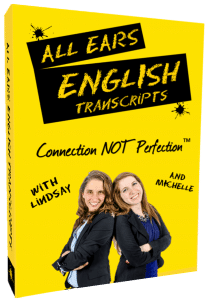
Do you stop to think about who you are sending an email to before you send it?
Do you write your business English emails differently depending on who is receiving the email?
You are likely going to speak to a boss differently in an email than you would just a friend.
We’re going to look at what to say depending on who you are talking to in an email.
Here’s a letter that asks about this and is likely what you have been wondering about too.
Get Your Transcripts!

Make sure you understand every word you hear on All Ears English.
Bring your English to the advanced level with new vocabulary and natural expressions.Get the transcripts from today’s episode.
Learn to speak naturally with the American accent.
Hi Lindsay! I hope you’re doing great.
First I’d like to congratulate you on the incredible course “Secrets of The Connected Communicator.” Every lesson is just like an enhanced class. It’s a blast!
I want to take advantage of this email to ask you something. How do Americans finish a formal and an informal email? What are the appropriate things to say in this situation?
Thank you so much for your help!
Fabriciano
Knowing Your Audience
Sometimes when it comes to knowing the right things to say in English, it’s about knowing who you are talking to.
It helps to know your audience, such as who you are talking to and even the environment you are speaking within.
It’s so vital to know how the English language changes based on the audience.
With writing, it really is no different.
We write differently depending on who we are talking to, so we consider the audience.
Emails are written differently to a friend than they would be written to a boss.
You write differently when you are reaching out to a friend versus when you are applying to a job with a hiring manager.
Its about knowing who you are talking to, and then using this to help you to decide upon the right tone or way of speaking.
Breaking Down Formal vs. Informal
Formal: This may be more about something that is written out and therefore longer versions of communication. You may use phrases such as “I look forward to hearing from you soon,” or “Have a wonderful day” or “Thank you for your time.” More written out, longer versions.
Informal: This tends to include shorter and more direct phrases. You might say something in writing like you would speak it in everyday conversation. It may be shorter and have more exclamation points too. You might say things such as “See ya soon!” or “Talk to you later!” or “Have a good one!” or even just “Thanks!”
If you are being a little casual you can also sign your name with just the first letter of your first name.
If you are being more formal, you may use your whole name.
Understanding the difference between formal and informal emails especially in business can really be a great way to know exactly what to say.
Takeaway
Overall, with levels of formality in business English, the more formal you want to be, the more full words you use.
It can also be true that the fancier the words actually sound.
If a friend wrote “sincerely” to me, it would sound too over the top.
Consider the context, who you are talking to, and even the environment and it will help to dictate the proper way of communicating.
If you have any questions, please leave them below in the comments section.
We’ll get back to you as soon as we can.








